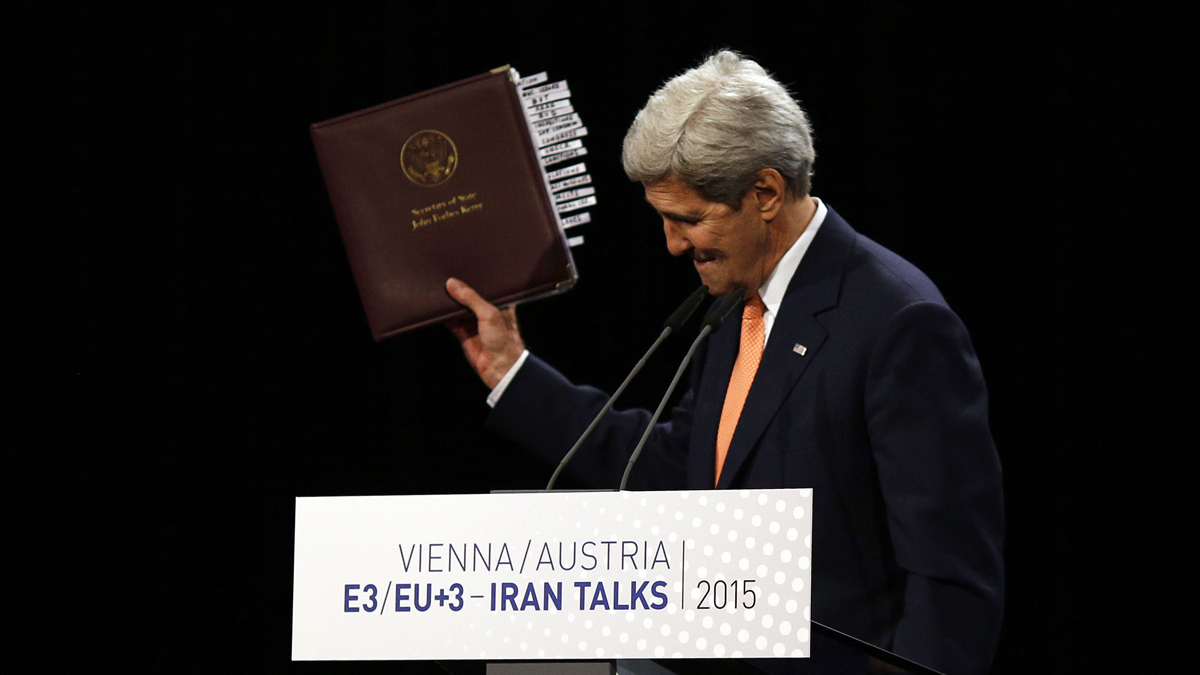EU and US poised to lift Iranian sanctions
Reconnecting the country to the global economy could have widespread geopolitical consequences

A free daily email with the biggest news stories of the day – and the best features from TheWeek.com
You are now subscribed
Your newsletter sign-up was successful
The International Atomic Energy Agency is today expected to announce whether Iran has fulfilled its obligations under a multilateral deal signed last July.
If it has, both the European Union and the US will formally lift the sanctions that have been in place for nearly a decade and reconnect Iran to the global economy.
What does this mean for Iran?
The Week
Escape your echo chamber. Get the facts behind the news, plus analysis from multiple perspectives.

Sign up for The Week's Free Newsletters
From our morning news briefing to a weekly Good News Newsletter, get the best of The Week delivered directly to your inbox.
From our morning news briefing to a weekly Good News Newsletter, get the best of The Week delivered directly to your inbox.
This is the moment when "ordinary people in Iran will start feeling the impact of the landmark deal", says The Guardian, as "Iranian banks re-establish connections with the European financial system and private firms pursue business opportunities without fear of Western punishment".
But the long-awaited moment may prove to be "a bit of a political and economic letdown" for the Islamic Republic, says USA Today: with the price of oil continuing to fall, the annual revenues from exports may be less than half of what was estimated.
What is certain is the immediate impact a $56bn-$100bn (£39bn-£69bn) cash infusion released from frozen assets will have on the country. Washington had hoped this money would filter down to Iran's growing middle-class and empower them to push for a more liberal society. However, USA Today suggests it may instead be used to build up the country's military capability and prop up those in power.
What does it mean for the world economy?
A free daily email with the biggest news stories of the day – and the best features from TheWeek.com
It might not be the "sexiest of titles", says the BBC's economics editor Kamal Ahmed, but Implementation Day "is certainly one of the most important dates of the year for the global economy, alongside its diplomatic and political significance".
Iran has the fourth-largest oil reserves in the world and intends to increase output by half a million barrels a day almost immediately. Coupled with the ban on US oil exports due to expire this year, the global energy market looks ready to become even more saturated, driving oil prices down even further.
How will it affect diplomatic relations?
In a sign of what is at stake, both the US and Iran moved quickly to avoid a diplomatic incident after ten US sailors were captured by the Revolutionary Guard earlier this week. The Independent says the two countries have worked "too long and too hard on the nuclear deal and have too much to lose by abandoning it now".
The big question is whether the agreement will strengthen Iran's hand in the Middle East, especially against its military and economic rival Saudi Arabia.
For their part, the Saudis have continually voiced their concerns about Iran’s newfound wealth. Following a meeting with US Secretary of State John Kerry, Saudi Arabia's foreign minister Adel al-Jubeir said:
"Every country in the world is worried about this. Iran's record has been one of war and destruction, terrorism, destabilisation, interference in the affairs of other countries and the concern in most countries in the world is that Iran not use these funds in order to fund destabilisation activities, but instead use the funds to improve the wellbeing of its people."
Experts will be watching closely to see the effect sudden wealth will have on the various proxy wars Iran is fighting, most notably in Syria.
-
 Will increasing tensions with Iran boil over into war?
Will increasing tensions with Iran boil over into war?Today’s Big Question President Donald Trump has recently been threatening the country
-
 Corruption: The spy sheikh and the president
Corruption: The spy sheikh and the presidentFeature Trump is at the center of another scandal
-
 Putin’s shadow war
Putin’s shadow warFeature The Kremlin is waging a campaign of sabotage and subversion against Ukraine’s allies in the West
-
 Will increasing tensions with Iran boil over into war?
Will increasing tensions with Iran boil over into war?Today’s Big Question President Donald Trump has recently been threatening the country
-
 Epstein files topple law CEO, roil UK government
Epstein files topple law CEO, roil UK governmentSpeed Read Peter Mandelson, Britain’s former ambassador to the US, is caught up in the scandal
-
 Iran and US prepare to meet after skirmishes
Iran and US prepare to meet after skirmishesSpeed Read The incident comes amid heightened tensions in the Middle East
-
 Which way will Trump go on Iran?
Which way will Trump go on Iran?Today’s Big Question Diplomatic talks set to be held in Turkey on Friday, but failure to reach an agreement could have ‘terrible’ global ramifications
-
 Israel retrieves final hostage’s body from Gaza
Israel retrieves final hostage’s body from GazaSpeed Read The 24-year-old police officer was killed during the initial Hamas attack
-
 China’s Xi targets top general in growing purge
China’s Xi targets top general in growing purgeSpeed Read Zhang Youxia is being investigated over ‘grave violations’ of the law
-
 Panama and Canada are negotiating over a crucial copper mine
Panama and Canada are negotiating over a crucial copper mineIn the Spotlight Panama is set to make a final decision on the mine this summer
-
 Iran unleashes carnage on its own people
Iran unleashes carnage on its own peopleFeature Demonstrations began in late December as an economic protest